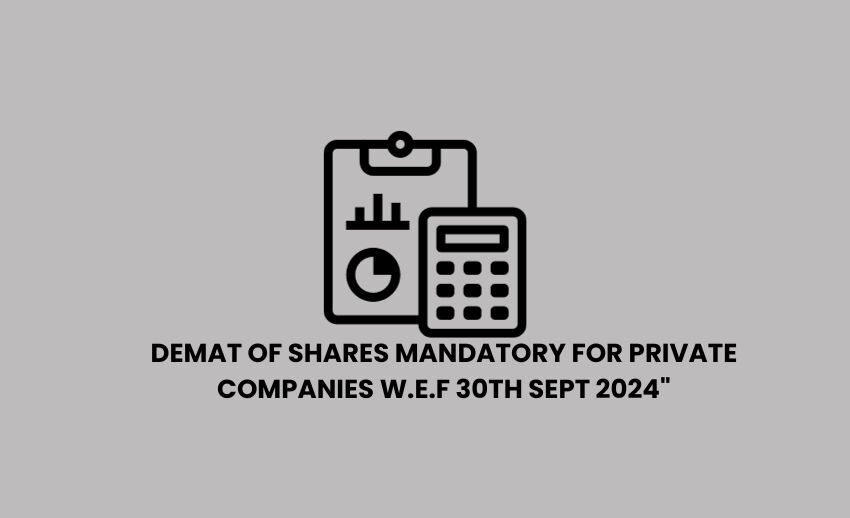
In a significant move towards enhancing transparency in corporate affairs, the Ministry of Corporate Affairs (MCA) issued a notification on October 27, 2023, introducing new rules under the Companies (Prospectus & Allotment of Securities) Second Amendment Rules, 2023. These rules make it mandatory for private limited companies, with the exception of Small Companies, to dematerialize their shares. Dematerialization of shares was already compulsory for public companies since October 2, 2018, and this new regulation extends the requirement to private companies.
The legal foundation for this regulation is based on Section 29 of the Companies Act, 2013, and Rule 9 of Companies (Prospectus and Allotment of Securities) Rules, 2024. Private companies, except Small Companies, are expected to comply with these rules within 18 months from the fiscal year ending on March 31, 2023, making the deadline for compliance September 30, 2024.
Section 29 of the Companies Act, 2013, outlines provisions related to the public offer of securities by a company. It establishes the conditions and procedures to be followed when a company intends to make a public offer of its shares or debentures. The section covers aspects such as the issuance of prospectus, the manner of making an offer, and the obligations of the company to comply with the regulations prescribed by the Securities and Exchange Board of India (SEBI).
Companies making public offers are required to adhere to the rules and regulations specified under Section 29 to ensure transparency, fairness, and protection of the interests of investors in the securities market.
MCA recently inserted Rule 9 B in Companies (Prospectus and Allotment of Securities) Rules as per which it is mandatory for private companies to issue share only in demat form and dematerialize existing shares till September 2024.
Small companies and government companies are exempt from these regulations. Small companies are defined as those with a turnover not exceeding Rs. 40 Crores and paid-up capital not exceeding Rs. 4 Crores.
The new Rule 9B, effective from October 27, 2023, mandates that every private company (excluding small companies) must issue securities only in dematerialized form and facilitate the dematerialization of all its securities. This means that shares and other securities must be converted into electronic form, making them easier to trade and manage.
Private limited companies not meeting the criteria for small companies as of the last day of a financial year ending on or after March 31, 2023, must comply with the rule within 18 months from the close of that financial year, i.e., by September 30, 2024. This includes offering securities, buyback of securities, issuance of bonus shares, and rights offers.
The consequences of non-compliance with this rule could result in penalties as per Section 450 of the Companies Act. The company and any officers in default may be liable to fines, with the maximum penalty reaching up to Rs. 10,000 and an additional fine of up to Rs. 1,000 for each day that the contravention continues.
To meet the requirements of Rule 9B, companies must obtain an International Security Identification Number (ISIN) for each type of security and inform all existing security holders about the dematerialization facility. Furthermore, they must submit Form PAS-6 to the Registrar within 60 days from the conclusion of each half-year, duly certified by a company secretary or chartered accountant.
This move is aimed at enhancing transparency and compliance in the corporate sector. While it may present challenges for larger private companies, understanding and adhering to the rules is essential to avoid penalties and ensure a smooth transition to dematerialized securities.

